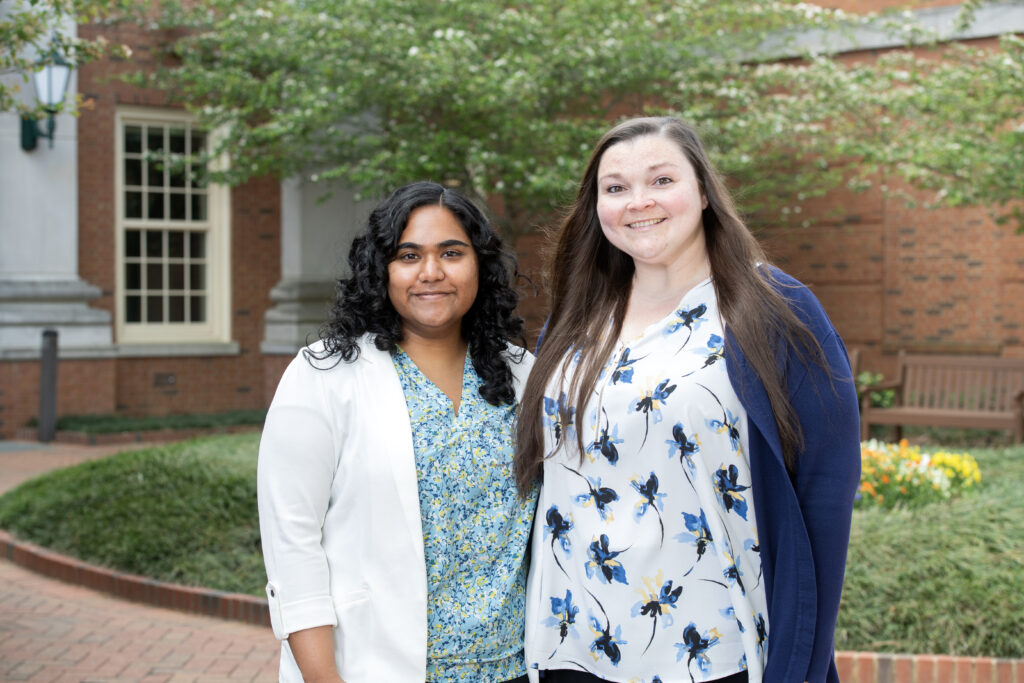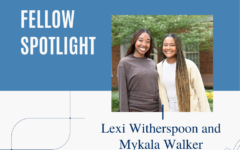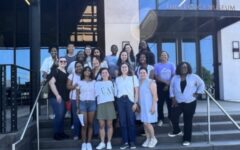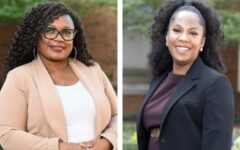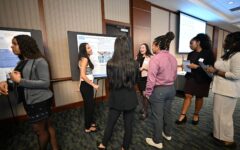Fellow Spotlight: These Fellows Are Working to Keep Children Safe Online and IRL
October 30, 2025 2025-11-03 15:23Fellow Spotlight: These Fellows Are Working to Keep Children Safe Online and IRL

Fellow Spotlight: These Fellows Are Working to Keep Children Safe Online and IRL
By: Javacia Harris Bowser
Three Schweitzer Fellows are advancing child safety through hands-on community projects—one focused on car seat education, the other on safe internet use. Together, they’re helping protect kids both on the road and online.
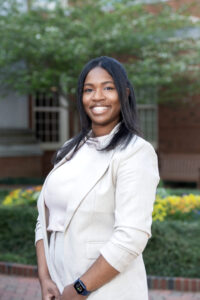
Shanquell Dixon
In 2022, more than 106,000 children were injured in car crashes, according to the Centers for Disease Control. Of the children who died in a crash, 35% were not buckled up in proper child restraints.
But Albert Schweitzer Fellow Shanquell Dixon doesn’t need statistics like these to know how important it is not only to ensure children are safely secured in automobiles but also that measures are in place to prevent a host of other unintentional injuries. As a general surgery resident and pediatric surgery research fellow at the University of Alabama at Birmingham’s School of Public Health, she’s treated countless injured children.
“I’ve had the privilege of working in the hospital over the last three years and noticed that minority children and children of lower socioeconomic status are disproportionately affected by unintentional injuries,” Shanquell said. “I hope that by educating parents of children within this demographic in Birmingham, we can address the present health disparities in pediatric injuries.”
That’s the focus of Shanquell’s project for her Albert Schweitzer Fellowship. Partnering with the Community Care Development Network, Shanquell will provide “Top 5 Child Safety Tips” flyers to families with young children. The flyers will focus on car seat safety.
“We see a lot of kids come in with head injuries because they were either not in a car seat at all, or they were in a car seat improperly and, unfortunately, a lot of times it’s minority kids,” Shanquell said.
Children under two should be in a rear-facing car seat. Once children outgrow their car seats, they should be fitted for booster seats. And children under 13 should sit in the back seat. These are just a few of the safety tips the flyer will include. Furthermore, Shanquell will refer families to Safe Kids Alabama, an organization led by Children’s of Alabama that provides car seat checkups, free car seats to eligible families, and more to help reduce unintentional injuries in children under 19.
Shanquell also plans to host safety workshops for expectant mothers that will cover various other topics, including the importance of keeping small objects out of reach, securing bookcases with wall anchors, using helmets when riding bikes, and ensuring infants have safe sleep areas.
Shanquell’s project is already underway, and she recently presented a safety workshop at a parent-to-parent community summit.
“People were pretty receptive,” Shanquell said, adding that many attendees noted they learned something new.
With her experience as a general surgery resident and pediatric surgery research fellow, Shanquell has plenty of real-life examples to share in her presentations.
“I think a lot of people don’t believe it’ll happen to them until it does,” Shanquell said. “When I mentioned the real-life examples during the parent-to-parent summit, people were shocked at a lot of the things. So, I think having that real life element will make it more of a reality for them and make it stick.”
As a parent to a toddler, Shanquell can also relate to the parents she’s seeking to serve.
“We bought anchors for the TV stand and everything else because he was pulling on stuff and he puts everything in his mouth!” she said of her son.
She urges the families she works with to give themselves grace and assures them she will do the same.
“I tell them, ‘I’m not here to be punitive and blame you for anything,’” Shanquell said. “I’m going through it myself, too. I just want us to protect our kids as much as we can.”
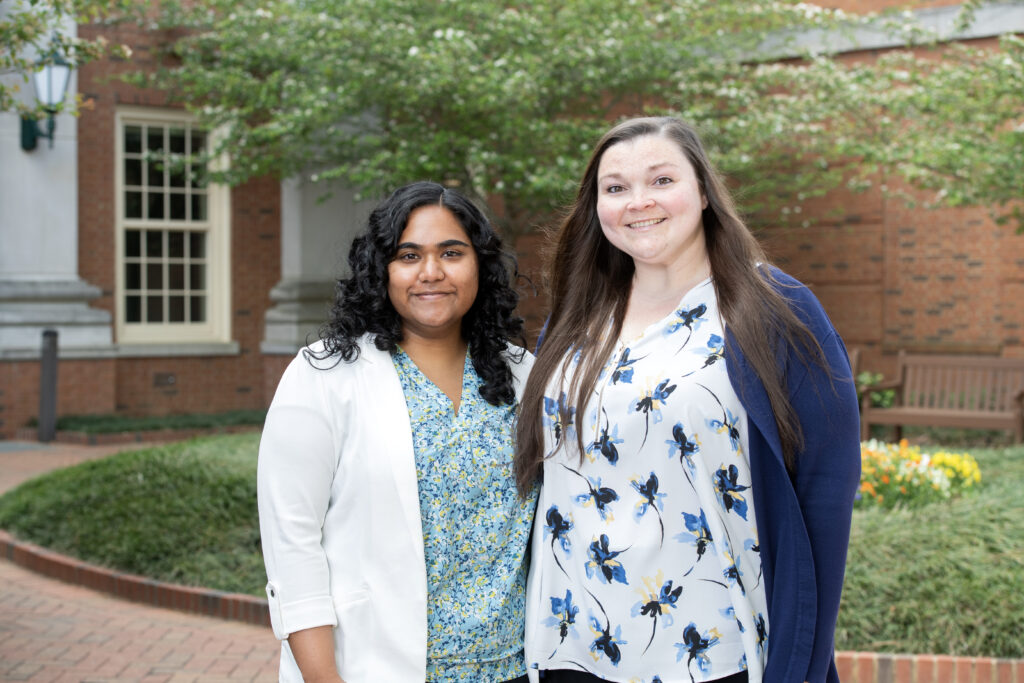
Raveena Baskaran and Elizabeth Speight
While Shanquell is working to keep children safe in cars and at home, Albert Schweitzer Fellows Raveena Baskaran & Elizabeth Speight are focused on keeping kids safe online. Cyberbullying gets a lot of attention, but the two Auburn University Harrison College of Pharmacy students believe there’s so much more that needs to be addressed.
Kids have access to their parents’ credit cards on devices and can fall prey to financial scams, they can be victims of grooming while playing online games, and many other online dangers.
Through interactive sessions and hands-on activities, and in partnership with the Boys and Girls Club of East Alabama, Raveena and Elizabeth are seeking to teach students how to use the internet safely, responsibly, and as a positive resource. Their curriculum sets– one for grades 4 and 5 and one for grades 6 and 7 — address current issues in digital engagement, including promoting kindness on social media, recognizing and responding to cyberbullying, and protecting personal information from online threats.
“This project topic is important to me specifically as I grew up in the rise of the internet and have seen and experienced how our interactions with the internet as a social and academic resource can have negative effects if not done safely,” Elizabeth said. “As I am considering pediatric pharmacy as a potential focus in my career, this topic will directly affect my prospective patients.”
Elizabeth and Raveena are also planning to work with Auburn Public Library to host internet safety workshops for parents.
“For the parent workshops, we want to inform them of their roles at home in keeping their kids safe and give them the tools to do that,” Elizabeth said, adding that many parents believe their children are safe if they are, for example, only playing games for kids.
“That can be really dangerous if you don’t have an idea of who they’re actually interacting with,” she said. “It’s important for them to understand that in order for their kids to be safe online, they have to play an active role.”
Raveena hopes the skills the kids participating in their project learn will help them in many years to come.
“Not everyone has access to education about internet safety due to socioeconomic status, location, or community support,” she said. “This project will help families experiencing these challenges by providing research-supported education to children in the community and hopefully bridging the gap in access to education in this topic. I hope that this childhood experience shapes well-informed adults and promotes mental wellness.”

